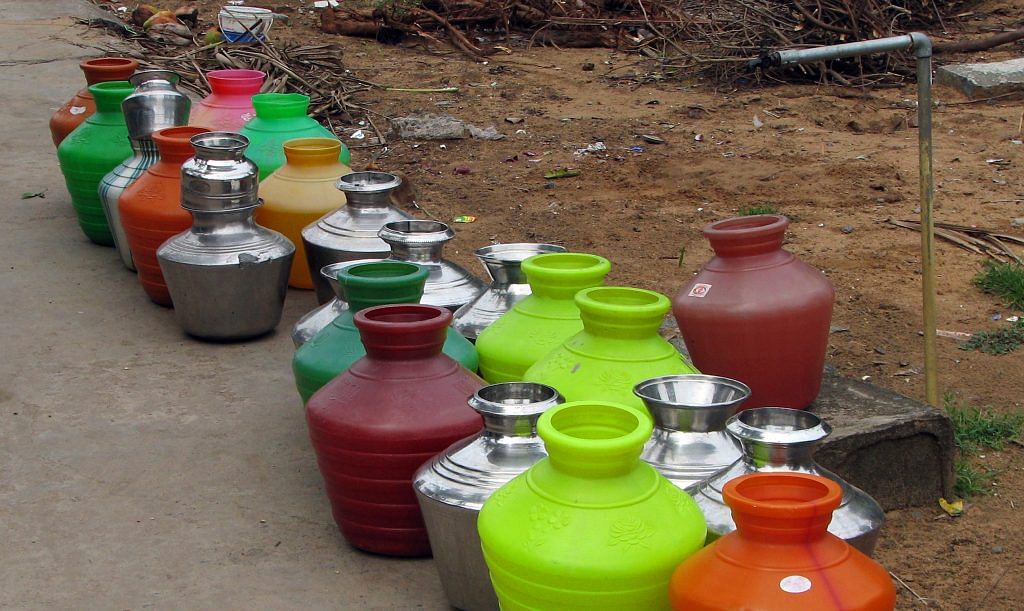New Delhi: Consumers in rural India may have to pay a nominal monthly fee for piped water supply in their homes under the Modi government’s ambitious Nal Se Jal scheme.
The Jal Shakti ministry is looking at different models to ensure piped water reaches rural homes while finalising the contours of the scheme before it is submitted to the union cabinet. Some of the models that the ministry has reviewed exist in Telangana and Bihar, where a monthly or an annual fee is charged from households for providing piped water.
The ministry, however, is yet to take a final call on whether it will levy a user fee on consumers under the scheme, one of the most ambitious programmes to provide piped water supply to every rural household by 2024. “We are looking at different sustainable options,” said an official familiar with the matter.
The Modi government has allocated Rs 10,000 crore this year for the flagship piped water scheme, Union Jal Shakti minister Gajendra Singh Shekhawat had informed Parliament on 11 June.
Ministry sources, however, said this will not be enough. The ministry is expecting more funds in the supplementary budget.
“It can’t be a one-size-fits-all approach. We are looking at different existing schemes in both rural and urban areas to see what will suit us,” the source said. “One thing that we have decided is that all the schemes will be community owned. This will act as a motivator for the people to participate.”
Also read: Modi govt’s big water push in Budget 2019: Rs 8245 crore for Jal Shakti ministry
The state models
Some of the existing state schemes that the ministry is looking to replicate include the Mission Bhagiratha launched in Telangana, Bihar’s Mukhyamantri Gramin Peyjal Yojana and the Nagpur 24×7 water supply programme. The last scheme, however, is operational only in the urban areas of Nagpur.
The Mission Bhagiratha was one of the key poll promises of Telangana Chief Minister K.C. Rao ahead of the 2014 assembly elections. Launched in 2016, the scheme aims to provide piped water connection to 20 lakh households in urban and 60 lakh household in rural areas of Telangana. While households falling below the poverty line have to pay Re 1 a month to get piped water supply, the fee is Rs 100 for other households.
The Gramin Peyjal Yojana in Bihar, also launched in 2016, proposes to provide all households in 4,291 gram panchayats clean drinking water supply through community participation by 2019-2020. In all, 2 crore households will be provided clean drinking water facilities. Those from below poverty line households have to pay a monthly fee of Rs 30 for the piped water supply, while the rest have to pay Rs 60 per month.
Nal Se Jal to have performance-based funding
Sources said the draft for Nal Se Jal scheme being readied proposes that states will be given funds based on their performance. “There will be inter and intra-state competition. States or districts that perform well in terms of meeting the fixed targets will get more funds,” the source said.
There will be special focus on rain water harvesting, ground water recharge and recycling water. “States that perform well on these counts will be incentivised,” an official of Jal Shakti ministry, who did not want to be named, said.
The ministry is fixing yearly targets for improving the piped water supply. “For instance, it has been proposed that in the 2019-20 fiscal, the piped water supply in rural areas will be increased to 30 per cent from the existing 18 per cent,” the source quoted above said. “It will gradually increased every year till a 100 per cent saturation is achieved by 2024.”
There will be some mandatory components of the schemes that states will have to implement, the source said. These will include setting up bore and tube wells in areas where there is no infrastructure to supply water along with pumps with dry sensors and recharge structures among others.
Nal Se Jal was one of the first schemes announced by the Modi government in its second term. It is an upgraded version of the National Rural Drinking Water Programme (NRDWP), launched by the Congress-led UPA government in 2009. The NRDWP had aimed to provide drinking water supply in rural areas by 2030 at an estimated cost of Rs 6 lakh crore.
Also read: Modi pointsman Bharat Lal sent to key water ministry in bureaucratic reshuffle
